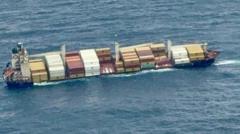Authorities in India's Kerala state have gone on high alert following the capsize of a Liberian-flagged cargo ship, MSC ELSA 3, which sank off the coast near Kochi. The incident transpired early Sunday morning due to flooding in one of the vessel's compartments, resulting in a significant leak of hazardous materials and oil into the Arabian Sea.
All 24 crew members managed to be safely rescued by Indian navy personnel following a lengthy operation, but the situation remains concerning as some of the ship’s 640 containers have begun drifting toward the coastline, compelling evacuations of areas near the shore. The coastline in this region is known for its rich biodiversity and is a popular tourist spot, raising fears about potential ecological impact.
A statement from the chief minister's office emphasized the seriousness of the situation: “As the oil slick can reach anywhere along the Kerala coast, an alert has been sounded across the coastal belt.” Local residents have been warned to avoid touching any leaking containers or the oil already washing ashore. Fishermen have also been advised to stay away from the sunken ship site.
In response, authorities have ramped up pollution control measures to curb the environmental threat. The Indian Coast Guard has deployed specialized ships equipped with pollution containment gear to the accident site and has dispatched an aircraft with an oil spill detection system to assess the scale of the leak.
Of particular concern is the ship’s hazardous cargo, which includes 13 containers of materials known to pose a severe risk if they react with seawater, including 12 containers of calcium carbide. Additionally, the cargo hold contained around 84.44 metric tonnes of diesel and 367.1 metric tonnes of furnace oil, further exacerbating the potential disaster.
As cleanup and containment efforts continue, authorities are working diligently to minimize the human health and environmental impacts stemming from this maritime disaster.




















